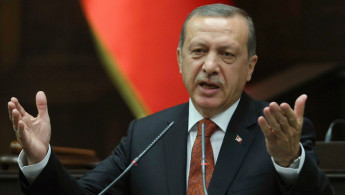Press freedom at risk in Turkey's landmark election
Baris Ince, age 33, stood in an Istanbul courtroom on June 2.
The journalist had come to defend himself against charges of defamation against Turkey's president, Recep Tayyip Erdoğan.
"I did not insult anyone," said Ince. "My criticism was political. I do not think my newspaper article was a crime."
Ince, chief editor of BirGün Media, had covered corruption charges against both Erdoğan and his children (his son, Bilal and his daughter, Esra Albayrak). Ince looked at the records of Türgev, the Foundation of Youth and Education in Turkey, which is associated with the family.
He found irregularities in the donations and use of the foundation's money. For that story, Ince was slapped with a serious defamation charge.
"A journalist should be spat upon for not writing about corruption," Ince's lawyer, Tolgay Güvercin, told the court.
The charges against the Erdoğan family continue to pile up. A new book by Hürriyet's Tolga Tanış, Potus ve Beyefendi ["The President of the US and the Gentleman"], alleges that Esra Albayrak's husband made a fortune in an oil deal between the Iraqi Kurdish authorities and the Turkish government.
The revelations - legally dangerous for Erdoğan's family - have raised tensions between Turkey and Iraq, which has opposed direct deals with the Kurdish autonomous region.
Ambitions
Turkey goes to the polls on June 7 to elect its 550-seat parliament. If Erdoğan's Justice and Development Party (AKP) win two-thirds of the seats - 367 - it would be able to amend the constitution and give the presidency remarkable powers.
The only brake on Erdoğan's ambitions is the fate of the Kurdish and Leftist People's Democratic Party (HDP), which could take more than ten per cent of the vote, win 70 seats and deny Erdoğan his super-majority.
Over the past few years, Erdoğan's "populism" has revealed itself - massive displacement of the working-class to make way for glass and steel construction; disregard for miners and industrial workers, as evidenced by the callous approach to the Soma mining disaster; an ardent foreign policy that includes obstinance on Syria.
Reporters who try to raise these issues face court challenges and intimidation.
| A journalist should be spat upon for not writing about corruption. - Tolgay Güvercin, lawyer |
Can Dündar, editor-in-chief of Cumhuriyet, published photographs of trucks believed to be from Turkey's National Intelligence Organization (MİT) carrying arms across the border into Syria.
On June 2, Erdoğan's lawyer, Muammer Cemaloğlu, told the Ankara Chief Public Prosecutor's Office that Dündar had published a fake video given to him by "the parallel state" - code perhaps for the movement of Fethullah Gülen, the man Erdoğan sees as his nemesis.
This is not the only other case apart from that of Baris Ince. BirGün itself faces more than 50 cases - a sure-fire way to try and silence the critical media. The Journalists Union of Turkey put it plainly: "Journalism is not a crime."
Sadly, in Turkey, it is. Last year, Reporters Without Borders called Turkey "the world's biggest prison for journalists".
The International Federation of Journalists says that at least twenty-one journalists are behind bars for doing their job.
Reporters Without Borders says the number is twice that.
Last year, Erdoğan went after The Economist's Turkey correspondent, Amberin Zaman, for some comments she made on a television programme. Erdoğan called Zaman "a shameless militant woman disguised under the name of a journalist".
This week, on May 30, The Economist ran a story with the headline: Why Turkey should vote Kurd. It is the best way of stopping the country's drift towards autocracy. It was a non-veiled reference to the HDP.
Journalism
Faced with pressure from the government, BirGün, a left-leaning daily, has tried to be innovative.
Headlines read This News Is Banned - in order to inform the public about what is not allowed to be said. Ömür Şahin Keyif, a journalist at BirGün, who also faces defamation lawsuits, said that the cases against the paper are like a
"gun of the government" to editors' heads.
Many large cases are resolved with high compensation fees, which would sink an independent paper such as BirGün.
Last October, Baris Ince decided to act against the barrage of lawsuits filed against him for his reporting on corruption.
After the 1971 coup d’état in Turkey, the veteran journalist İlhan Selçuk printed an acrostic in an article, spelling out "I am under torture".
Ince, drawing from that example, wrote an article in BirGün in which the first letters of each line spelled out Hırsız Tayyip, Tayyip the Thief. It was this act that earned him the defamation charge.
The court decided to delay Ince's hearing until October 22. The axe continues to hang over the head of the Turkish press.
If the AKP wins a super-majority on June 7, matters will be grave. But the mood of journalists indicates that Erdoğan will face a serious fight. BirGün called on its supporters to fill the court on June 2. They came - not only from the BirGün staff, but from other papers.
Erdoğan's lawyer told the court: "My client is a victim." He was greeted from the gallery with laughter.



